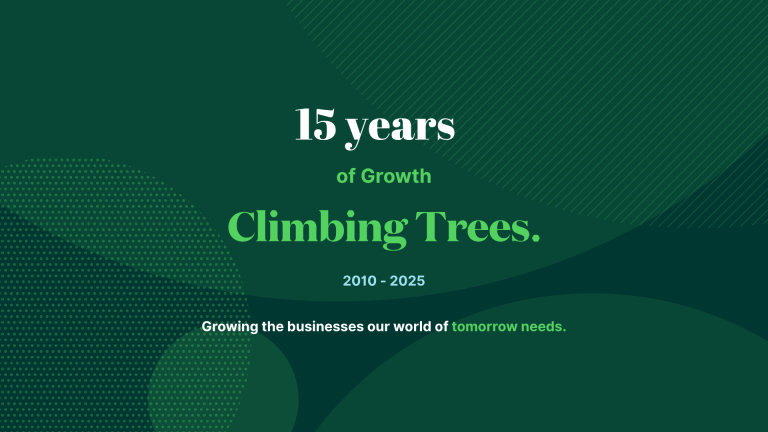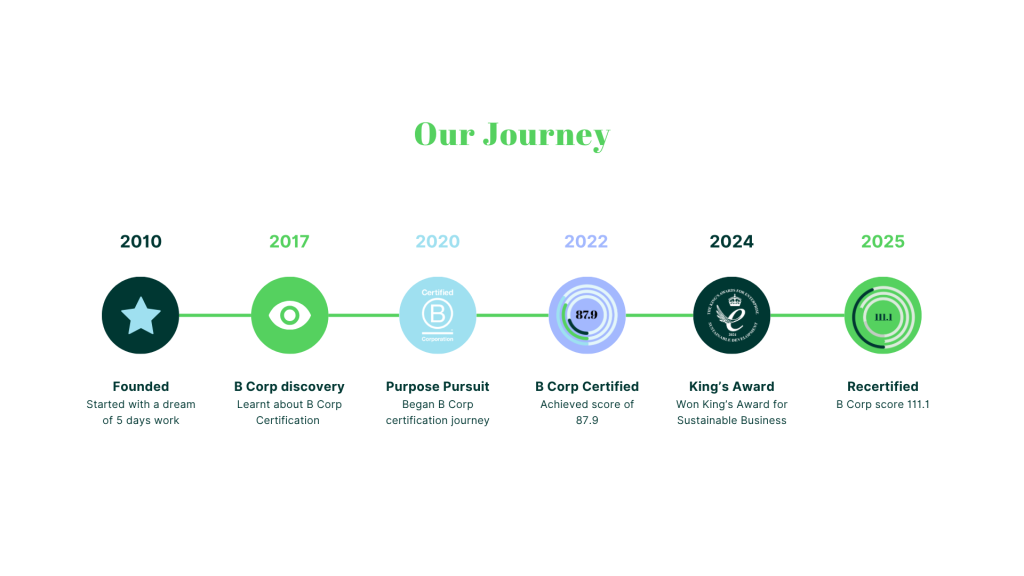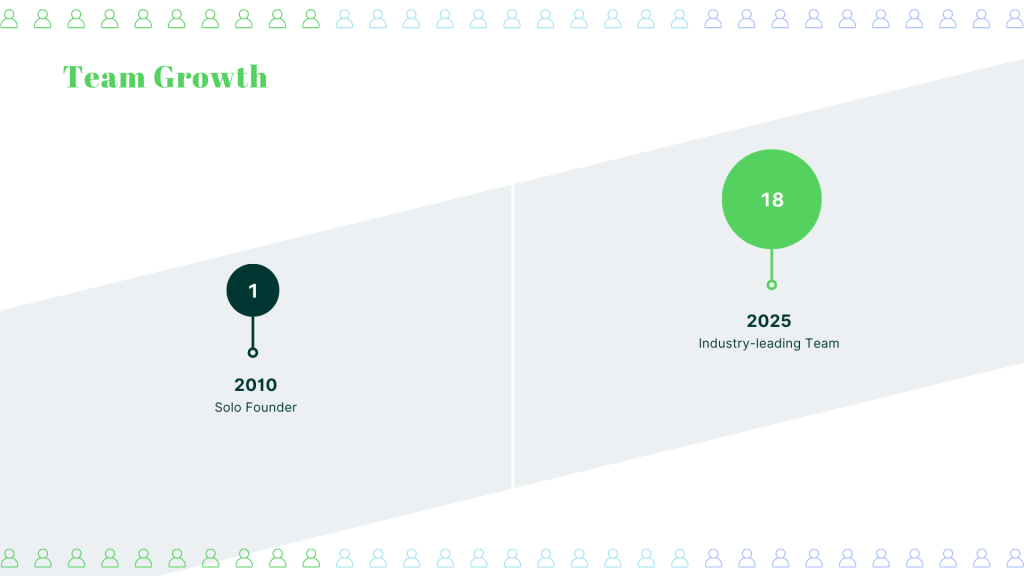A Journey Through Digital Marketing and Responsible Business



Managing Director and Founder, Alex Holliman
As Founder and Managing Director of Climbing Trees, my digital marketing journey began in the early 90s with Zenith Media, part of Saatchi & Saatchi. I then held roles at several leading UK independent agencies, managing campaigns for prominent brands such as Lloyd’s, Waitrose, London Zoo, and Amnesty International. In 2001, I decided to leave London to join a start-up, where I launched and built its online marketing division, helping grow the business to a £25 million turnover.
The Birth of Climbing Trees
In 2010, I started Climbing Trees, aiming simply for five days of freelance work — a goal I met within a few months. Digital marketing then buzzed with Google’s Penguin and Panda updates, which focused on bad backlink histories and thin content targeting specific keywords on strong domains.
From the beginning, we encouraged clients to create high-quality, user-focused content, and emphasised content freshness — a priority after a key Google update. In Google Ads, desktop users dominated, as mobile targeting, tracking, and attribution were just emerging. Google was already predominant. We focused heavily on remarketing, especially for our eCommerce clients.
Climbing Trees began with just me in a home office, a stack of paper, and a truly terrible WordPress site I built myself. We initially offered affiliate marketing, paid search, organic search, social media advertising, and media buying. Now, we’ve grown and consolidated our services to include paid search, paid social, and organic optimisation for traditional search engines and LLMs. We are a team of 18 with bold plans for continued growth.
Five or six years into the Web 2.0 era, Google, Amazon, and Facebook gained significant traction. While the main channels remain similar, the big change is AI. Web 2.0 companies now heavily invest in AI, and new entrants like ChatGPT, Claude, and Perplexity are reshaping the internet. Internal “black box” AIs now automate many ad decisions, a trend I believe will continue.
We’ve been fortunate to work with amazing clients over the years. Our first major client was Olympus Cameras, who remain a client to this day. We’ve run their pan-European campaigns for a long time and deeply value their business. Our oldest clients, Brentwood Communications and Grassform, joined us in our first months and have remained with us ever since. Both businesses have grown and evolved phenomenally, and we’ve been able to support their expansion and meet the challenges they’ve presented, just as we have evolved ourselves.

Embedding Purpose
Pursuing B Corp certification was a key milestone. I learned about B Corp in 2017 from a friend, Nihcola, whose agency, Voice Communications, went through the process. I began exploring it for Climbing Trees in 2020, just after lockdown began.
It has been transformative for our business across the five core pillars: internal governance, client treatment, staff management, local community engagement, and environmental sustainability.
While we’ve always excelled with clients, we’ve further improved by doubling down on client surveys, giving them a direct voice in our business and how we align our work.
We’ve also completely changed our operations to mitigate our environmental impact and are focusing on the types of clients we work with. We’re also intensifying our efforts to improve our service to the local community, with some exciting initiatives planned for 2025.
Our commitment to responsible business was recognised in 2024 when we won the King’s Award for Sustainable Business, an incredible experience that led me to Windsor Castle to meet the King.
We became a B Corp in 2022 with an impact score of 87.9 out of 200 (UK average: 50.9). We recertified in 2025, and our score improved to 111.1, reflecting the team’s continued efforts. The impact assessment highlighted four key SDGs: gender equality, decent work and economic growth, reduced inequalities, and climate action. These goals remain at the heart of our work.

Client wins are always appreciated, and we value the long-term relationships we develop, where we have a deep, meaningful impact on both the businesses and the people within them. Working with clients who share our values is crucial. A particularly exciting win for me personally was securing the Greenpeace account and consolidating that work; we’ve now collaborated with them for many years, which is truly amazing.
Building An Empowered Team
Our team has grown to 18 people, and we are focused on building a leadership team that empowers individuals to lead their own careers and shape the agency’s vision.
Prior to the pandemic, I was exceptionally sceptical of remote working, believing it wouldn’t succeed. I was traditional, preferring people in the office five days a week, and viewed work-from-home requests with scepticism. The pandemic changed this. The team proved responsible and productive, and the work-life balance benefits have exceeded my expectations. One of many things I have been wrong about!
Managing well-being and stress remotely, as well as fostering team relationships, remain challenges. We aim to gather the UK team quarterly, and local members meet weekly for connection, collaboration, “water cooler” moments, and group thinking for our clients. We’ve also introduced a Slack system: 1 means “not enough to do,” 5 means “busy but fine,” and 10 means “urgent help needed.” This ensures we support each other, as spontaneous offers of help are less common remotely. We may encourage requesting extra assistance on pressing deadlines or when a second pair of eyes is needed.
One of the significant benefits of our remote approach is the exceptional team we’ve assembled. We have industry-leading practitioners who bring a wealth of phenomenal experience to our clients, primarily because we’re not limited to recruiting within a 30-mile radius of the office.

Looking Ahead: The Role of AI & Human Insight
Looking ahead 15 years, we are amid a surge in AI interest. While being cautious not to be overly pessimistic or excessively hyperbolic, I worry that we are in an “AI bubble,” where the excitement around Large Language Models (LLMs) may not fully deliver on the promises we envision for humanity, and specifically, the marketing industry.
There might be an upper limit to this current wave of interest, potentially leading to a significant pullback. However, my belief is that AI will primarily serve as an assistant to humans, with human judgment remaining crucial. Therefore, I anticipate that humans will always stay “in the loop” (as is the parlance of the day), though the exact number of humans involved might evolve.
One aspiration is to develop various AI agents to support the business, such as marketing, finance, copywriting, ad copy for search, analysis, and strategy agents. Whether these agents are centralised within one company or distributed through a SaaS ecosystem of individual providers, I believe they will empower us to deliver our most impactful work for clients.
Privacy will remain crucial, especially in Europe. It will be fascinating to see how privacy evolves as AI systems collect more personal data. Marketing will move beyond keywords—e.g., a vegan searching “restaurants” will see different, more relevant results than a meat-eater. I believe users will want clear visibility and control over information AI systems hold about them.
Furthermore, I foresee changes in monetisation models. Currently, platforms like Google take 100% of the revenue from a click. However, a model could emerge where, for example, if ChatGPT facilitates a hotel booking and monetises it through a 5% revenue share, a portion of that revenue could be passed on to the user as an incentive. I believe the affiliate industry, in particular, will embrace this “quid pro quo” model, where platforms take a percentage. Still, users also receive a share (similar to how Quidco operate in the UK), potentially becoming more commonplace.
Our Vision for the Next 15 Years
For our business, I hope to cultivate an industry-leading leadership team that surpasses anything I’ve previously brought to the company, driving us forward for the next 15 years. With this, I aspire for us to collaborate with clients who are pioneers in sustainability and innovation, a genuine passion of ours.
My hope is that as a business, we can decouple our growth from our carbon emissions. Currently, a 20% growth in the business also results in a 20% increase in carbon emissions, which we are actively working to reduce.
We have no Scope 1 emissions and minimal Scope 2 emissions. Our Scope 3 emissions are linked to our supply chain, and we aim to identify and work with suppliers who measure and manage their carbon footprints, enabling us to actively reduce our own. This is a significant undertaking.
I envision that our purpose will grow to become the core of our business, guiding how we think more eloquently about and develop our approach to clients, staff, the local community, the environment, the types of clients we work with, and the impacts those clients have — whether on their supply chain, employees, the downstream effects of their products, their carbon footprint, or the circularity of their products. This will enable us to truly lean into and help businesses grow in a way that addresses the world’s pressing problems.
Finally, we are excited to see what the next 15 years bring, ensuring that purpose and heart remain at the core of everything we do. I would like to extend my sincere gratitude to all our staff, past and present, for their invaluable contributions to our growth and success. I also thank every client who has backed us and given us the opportunity to demonstrate the results we can achieve. And, of course, thank you to our vibrant ecosystem of partners — tech platforms, collaborative agencies, and suppliers — we couldn’t have done this alone.


